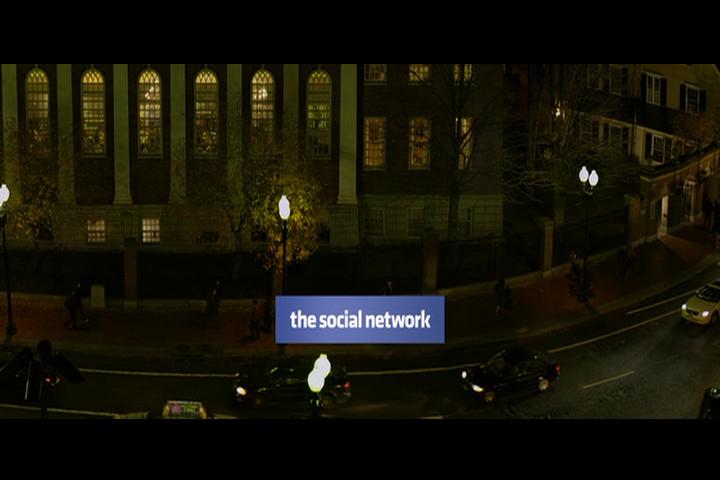
BUY FROM AMAZON: CLICK HERE!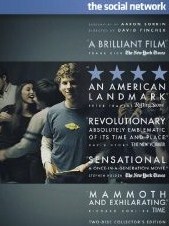
STUDIO: Sony Pictures
MSRP: $28.96
RATED: PG-13
RUNNING TIME: 120 minutes
SPECIAL FEATURES:
- Audio Commentary with David Fincher
- Audio Commentary with Writer Aaron Sorkin & The Cast
- How Did They Ever Make a Movie of Facebook?: feature length documentary
- Angus Wall, Kirk Baxter and Ren Klyce on Post
- Trent Reznor, Atticus Ross and David Fincher on the Score
- In the Hall of the Mountain King: Reznor’s First Draft
- Swarmatron
- Jeff Cronenweth and David Fincher on the Visuals
- Ruby Skye VIP Room: Multi-Angle Scene Breakdown
The Pitch
The upper class finds a new way to occupy your time.
The Humans
Jesse Eisenberg, Andrew Garfield, Armie Hammer, Justin Timberlake, Monique Edwards, Rooney Mara and Rashida Jones
The Message
What Mark Zuckerberg represents scares the hell out of me. Mr. Zuckerberg spent the better part of the last decade working as the worst kind of creative force. While I normally don’t care about the forces conspiring to destroy the modern world, Zuckerberg took that destructive energy into my realm. He made the Internet cool for the masses. Some of you might be able to remember a time when the Internet was a safe haven for people looking up Dr. Who facts, photoshopped naked celeb jpegs and Sci-Fi chat.
Now, it’s the realm of every asshole with a wireless card. Internet democracy came at a price, as Zuckerberg had given the masses a service that was initially designed to exclude them. While Fincher and Sorkin’s The Social Network doesn’t portray Zuckerberg as a saint, it does show him as an innovator for creating such a dynamic. What’s sad is that we see the American Capitalist definition of innovation on full display. Cameron and Taylor Winklevoss created the basic concept behind Facebook with Harvard Connect. Trading on prestige tied to the Harvard name, the Winklevoss twins wanted to create a website for the elite.
The Social Network doesn’t ask us to examine the corrupted dual origin for both sites, but it does want to play Zuckerberg as a cunning manipulator. Aaron Sorkin has gone on record at various outlets stating that he didn’t want Zuckerberg to be shown as an outright villain. But, he also makes sure to follow that statement up with his ill-concern for the truth. When it comes to creating art, Sorkin tells the audience that he’s not concern with truth.
Where does that leave David Fincher? As a director, Fincher has done more to blend technological and story-telling achievement since Kubrick in his heyday. Whether it’s the expert use of digital cinematography or how CG was used to enhance Armie Hammer’s performance as the Winklevoss Twins; Fincher is not scared of the future. It’s pretty funny when you consider the subject matter that’s being scrutinized.
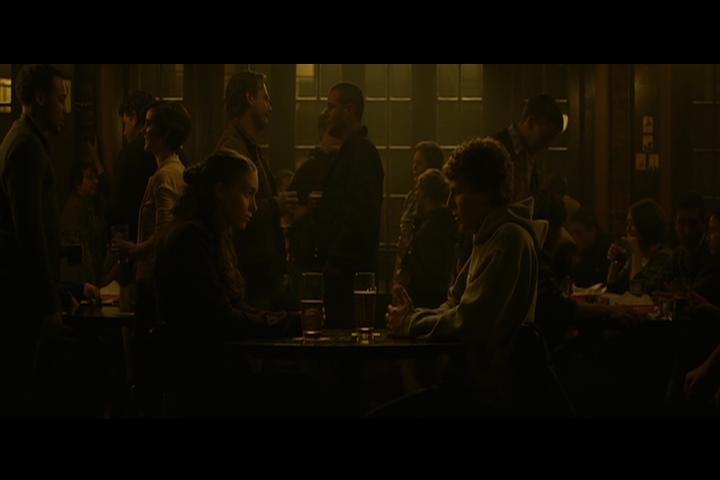
Facebook and the idea of social networking have changed interpersonal communication in a way that can never be revoked. Some critics might say that it’s the latest step in the dumbing down of the Western World, but I have to fight that. Facebook and its instant processing of information is daring humanity to rise to that next level. The cost of this advancement works as human decency and basic civility.
When we see Eduardo Saverin confront Zuckerberg after being scammed out of his own cash to start the next big thing, Fincher’s direction leaves us in awkward place. While we’ve spent the time before this scene rooting for Zuckerberg, we have the facts sitting out in front of us. Saverin is the American Public over the last decade. The constant moneybag that always has its purse opened for whoever seems to be hopeful. This country loves ideas, yet we don’t ever seem committed to the work that brings them forth.
Look at the film’s first act. See how Zuckerberg moves from Erica Albright to the creation of Face Smash to working with Saverin on the stolen Facebook concept. When he’s later confronted about the timeline in his deposition, Zuckerberg states that the material was there for him to take. Opportunity as determined by criminal intent is still an act of evil. I know that last phrase sounds odd, but look at it in the larger context of the film.
Zuckerberg is self-obsessed to the point of psychosis. That now famous opening scene between Zuckerberg and Albright was shot multiple names to set the tempo for what would follow. In those opening words, we see Zuckerberg for what he is and what he will become. He’s not a nerd, he’s not a geek, but he’s not normal.
Let’s examine that for a moment. So many people were dismissive of the Facebook movie in the mainstream press until its release. When the film debuted, we had to listen to scores of critics talk about how Zuckerberg marked a new kind of geek. This was supposed to be the first 21st Century movie in terms of approach and subject matter. Honestly, there’s nothing new about Zuckerberg’s fucked personality.
Jesse Eisenberg deserves his Oscar nomination, since he managed to offer up something that hasn’t been seen in mainstream cinema. Eisenberg got what made Zuckerberg tic, so he offered up a brilliant take on the matter. He’s an ASPY fueled machine that can’t understand why you care about emotional or personal investment. Such ambition left unchecked and without the restraints of moral concern can lead to exciting frontiers. You don’t have many warm people to compare Zuckerberg against, so that’s where we turn back to Eduardo Saverin.
Saverin is presented as a near-equal of Zuckerberg in terms of genius. When Saverin drafts the formula that will comprise the guts of Face Smash and Facebook, Zuckerberg doesn’t even think him for the work. Saverin just pushes along and uses his wealth to fund his friend’s dream. Andrew Garfield does the thankless supporting work of bringing Saverin to life, as Zuckerberg hogs every inch of the frame. Constantly pushed around and ignored for stretches of the film, Saverin is our proxy.
Following this to its logical conclusion, we catch up to the present with the deposition. Throughout the film, we watch Zuckerberg’s version of the past take place before our eyes. When facts are challenged, the focus is brought back to the present and Zuckerberg casually ignores what’s in front of him. It’s not about the rain beginning to fall outside the law firm’s office. It’s not about planting the chicken story in The Crimson. The present is about everything Zuckerberg did coming back to haunt him.
Treading into spoiler territory, I want to call bullshit on the film’s ending. When we are left with Zuckerberg for our final shared cinematic moment, he’s e-stalking Erica Albright. Those sad moments left in the office, we linger on the modern day Kane and his e-Rosebud. This moment is bullshit because Zuckerberg has learned nothing during the duration of the film.
We have a spoiled brat turned industry titan who is still pining for the girl who rightfully spurned him. Erica Albright had Zuckerberg figured out in the opening minutes of the film in a way that Zuckerberg couldn’t understand. People like Zuckerberg will never be able to understand what it means to be a good person. Sure, the term good is a little empty-handed. It’s just that it’s bare emotion that should be easy for any human to understand.
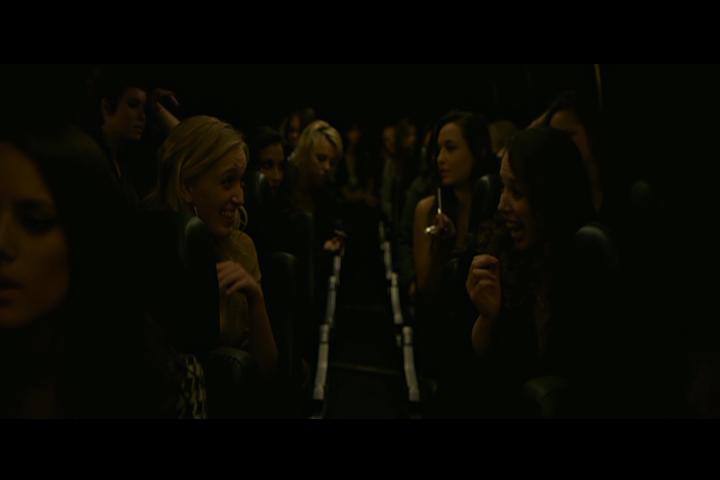
It’s easy to place the emotional disconnect on a world with borders ill-defined by the Internet. Brand-new landscapes are created where personas flow like water and you’re never placed into direct connection with human bodily cues. Think about that. You ever wonder why it’s so easy to get pissed at someone over the phone. You’re not physically seeing them respond to the conversation.
The human face is capable of little cues that trigger a response in the other involved partner. That opening scene is such an interesting breakdown of that fact, because Erica and Mark are face-to-face. It doesn’t even matter, as Zuckerberg’s head is so far up his ass that he can’t tell what’s going on. When Erica calls him on it, he begins to challenge her origins. When Albright becomes disgusted, Zuckerberg can’t register why she even cares.
When the deposition breaks for lunch and Zuckerberg finds interest in Marylin Delpy, she reiterates the same thing. Delpy however believes that Mark hasn’t become a full asshole, just a poseur trying to hide behind the cold shell. There’s got to be some truth in both claims, but so much of this movie is dependent on finding a way to ground Zuckerberg. David Fincher didn’t seem terribly concerned with making Zuckerberg likeable, but Sorkin’s script fights that cold nature.
Aaron Sorkin is going to win the Oscar for this film. People will praise his insight, while the producers will thank Zuckerberg for being a cutting-edge entrepreneur. The truth will be pushed further into the closet, as we celebrate Hollywood being Hollywood at the loss of a greater reality. Upon my second viewing, I realized that the film plays like a warped take on The Man Who Shot Liberty Valence. While we don’t have Carleton Young telling us to print the legend, we have multiple fractured personalities clamoring for their version of the legend.
The new world of social media is change in a split-second where ideas are commonplace and visionaries are few. The Winklevoss Twins failed to realize this. Divya Narendra failed to realize this. Eduardo Saverin saw it in his best friend, but he let emotion overpower common sense. To become a legend in the ADD world, one must be willing to sacrifice the present for the future.
Fighting and backstabbing to join the latest clubs is one aspect of it. But, Zuckerberg knew rejection once and felt like he could not contend in a direct battlefield. Therefore, he didn’t shoot the Liberty Valences of the world at their own game. He redefined the rules, stole someone else’s gun and beat ol’ John Wayne over the head. He’s not a hero. History will not remember this punk kid. If you have any doubts, I dare you to name the kid that shot Franz Ferdinand.
Gavrilo Princip was that man’s name and he became the spark that ignited a century’s worth of fighting in Europe and points beyond. Princip was a poor teenager that was desperately trying to join the Black Hand, so that he could liberate his country from tyranny. Mark Zuckerberg was a privileged upper-class kid who was mad because a girl called him an asshole. What a difference a century makes.
The Social Network is an important film. It marks one of the first times that the modern era has been examined from a historical standpoint. I’m not talking over-long Costner epics about weepy colonialism regrets. I’m talking social history about how we have progressed as people in this age of shrinking borders. You can find out information about anything from Garbage Pail Kids to your old girlfriend in a matter of seconds. Beams of information flow like the living Force through everything, as we impatiently wait for them to hit our portable devices.
The future is now and we’re wasting it. Name the last thing worth a damn that you did on Facebook. Did Facebook save your life? Did Facebook help you to become a better person? Then, why do we care about this site so much? I’m going to try to keep from slipping into overt commentary mode here, but I might falter.
So much of our on-line lives are built upon the backs of others. How dare we criticize people like Mark Zuckerberg for lifting ideas from others? We do that crap everyday and nobody says a word to us. We’re not public figures. We venture online and hit our usual haunts. Check the e-mail, read some blogs and hit up Facebook. None of these activities matter until you discover somewhere that can impose emotion.
It takes a lot to care about something that you didn’t birth. We visit so many places in the real world and in the fake life of the internet that they end up blending together. Our definitions of reality are constantly being challenged and we’re left wondering if we’re becoming assholes for neglecting one for the other. Non-verbal cues, personality conflict and general malaise mix together into a dangerous pool that leaves us wanting to seek sanctuary in one world over the other.

That’s where we enter into similar ground that the Mark Zuckerbergs of the world never left. If you don’t care about the relationships you build or the people with whom you conspire…then what’s the point? Sure, you can make some quick cash and open a few doors. But, you’re still the same fucked up person you were in the beginning.
The point of human existence is to become a better person, while reshaping the world into a friendlier place than when you found it. Your personal success is determined by a legacy of doing good work and having prosperity has a result. Ill-gotten gains and foul will don’t make you better. Such actions hurt your soul, as you try to make your way through a world that can be cold.
The chilling embrace of ignorance permeates through the real and online world. So many people blindly grab for an opportunity like Zuckerberg and hope that their naked ambition will cause them to advance. What they fail to realize is reflected in Eduardo Saverin’s assessment of Sean Parker. You will become a paranoid individual who will entertain into relationships and run them into the ground. When questioned about these actions, it will always be someone else’s fault.
I hate to sound like the bitter old man here, but that’s what’s wrong with the young people. Hell, that’s what’s wrong with every American since the end of World War II. The boon of those last few decades has created several generations of perfect individuals. That’s perfect with a lowercase P, as no one has truly earned the term since Ike lead the Allies. Where does that leave us?
Much like Zuckerberg, we are the bastard children of unchecked First World success. We live in an era where nothing is out of the realm of possibility, it’s only held back by our fears of achievement. I know that mantra borders on the lines of becoming elementary school dogma, but it rings true. That is if you overlook crushing socio-economic factors that can make or break your rise to the top.
Mark Zuckerberg exists as he does today, because he is a child of privilege. While he was a programming prodigy, he had limitless assistance from his dentist father. Tutored from a young age and given advantage after advantage, the prestige of Zuckerberg’s advancement loses it luster. It’s also what makes him seem like even more of a shit when compared to Erica Albright or Eduardo Saverin. Sure, Saverin came from a well-to-do background, but Saverin took an active lead in his continued wealth. Then, there’s poor Erica. We never even get the chance to learn more about Erica.
All we get to examine is a young woman running out of patience with a tiresome young man. Think back about that opening scene. Everything that might begin to paint a picture of Erica comes from Zuckerberg’s back-handed assessment of the lady. Then, when Erica finally stands up for herself…that becomes the genesis of Zuckerberg’s first website. A lesser man would’ve just given her a roofie and stuck his hand down the front of her pants.
A lesser man wouldn’t have been at Harvard. A lesser man would’ve been exposed as a shallow cretin long before Erica Albright ever showed up in his life. But, he’s so cool. The way that he shits on his friends and casually ignores the prosecution. Zuckerberg can buy your house and turn it into his ping-pong room. Yet, the guy still lives in a rented house in Palo Alto.
I keep asking you think and constantly re-examine what’s being offered up as evidence. A creepy asshole was Time’s Person of the Year for 2010. The magazine doesn’t have the greatest record for picking these guys, but what is that saying? Is Mark Zuckerberg the new legend of the American dream? I say no.

Mark Zuckerberg is a cautionary tale that will be ignored by a wealth-obsessed youth culture. The Great Recession shares that similarity with The Great Depression, as we’ve turned financial status into a sickening fetish. When did you start giving a damn about Facebook? Hell, I went back and saw that I joined in December of 2006.
My time in college was spent using printed facebooks to hunt down any potential freshman tail. If you were an older student, you were shit out of luck until the Yearbook arrived. Honestly, not much has really changed. Most people still use Facebook to stalk potential pieces of tail, while looking for the latest social information. Others use it to play games and ignore the rest of the world.
Is that what I’m supposed to take away from this? Is it a fact that the website and the film are a litmus test for the wired individual? Who decided that Mark Zuckerberg was worthy of that much power? Well, society did. Like a bunch of hurried lab rats, we fell into a pattern and started hitting that feed bar to check out what the other rats were doing.
Needless to say, we haven’t learned that the other rats are just hitting buttons to garner some sort of active response. B.F. Skinner would have a raging hard-on over the setup that Zuckerberg has created. Facebook is a virtual box where you can trap the world’s largest cross-section of people and begin to study them. Various apps, wall updates and general technical fouls are waiting to stimulate the user and provoke a response.
You don’t even have to study the response, as the user will update the minutia of their life for you. Human interaction is dead. Passion for the unknown is dead. All that matters is boxing the experience of living into a commonly shared box that is under constant observation. It’s not Orwell, people. It’s your goddamn lives!
I don’t support being scared of technology. We all need to embrace change, but we must take an active responsibility with the technology in our lives. Read up on what Facebook’s doing and understand how the world’s largest fishbowl will impact you. Mark Zuckerberg has made it public knowledge that he will sell your information to the highest bidder. Fight back against asshole tactics with knowledge.
If that’s not enough, just wait him out until Goldman Sachs buys control of the company. Then, you’ve got another corporate big-wig to run a social networking site into the ground. In the next decade, we’ll bury Facebook and move onto the next big thing. I’ll be more annoyed by kids that don’t have a grasp of language construction. My family will continue playing Farmville, as they install Zynga flash chips into their eyelids. Pushing forward to keep up with the Joneses, we will all become assholes alongside Zuckerberg.
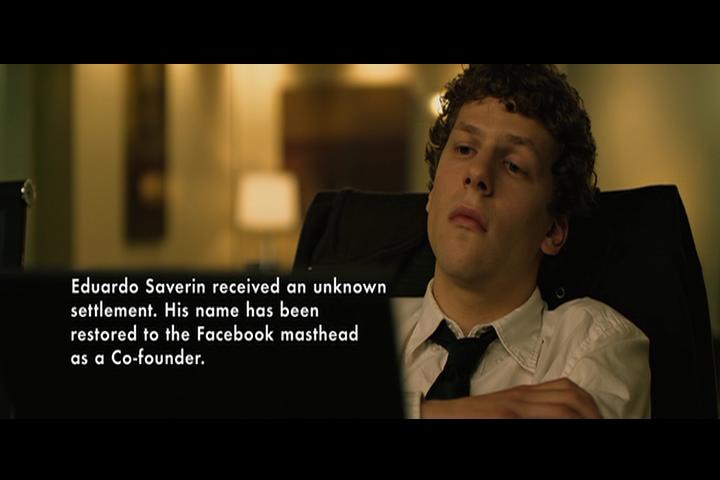
The Package
The DVD comes in a two-disc special edition that’s deceptively simple. David Fincher, Aaron Sorkin and the cast appear across two commentaries discussing every detail of the film. The real meat of the set is found on the second disc. The feature-length How Did They Ever Make a Movie of Facebook? documentary breaks down the production in regards to the complex visuals, the instant classic Ross/Reznor score and a breakdown of several of the film’s key scenes.
The A/V Quality is an impressive display for standard definition. While the Skye VIP room sequence has some jittering images during the more hectic action, the film holds up well. The Dolby 5.1 track gets exhausted across the entire soundstage, as so much energy is pumped through each channel without losing a word of dialogue. Three hours of special features wrapped in one of the most awkward DVD cases to ever come out of Sony. If they ever did have to revisit the release, I’d hope that Sony would rethink their slipcover/keepcase/cardboard over-hang packaging idea. Still, it’s better than whomever designed the case for Panic Room.
Rating: 




Out of a Possible 5 Stars